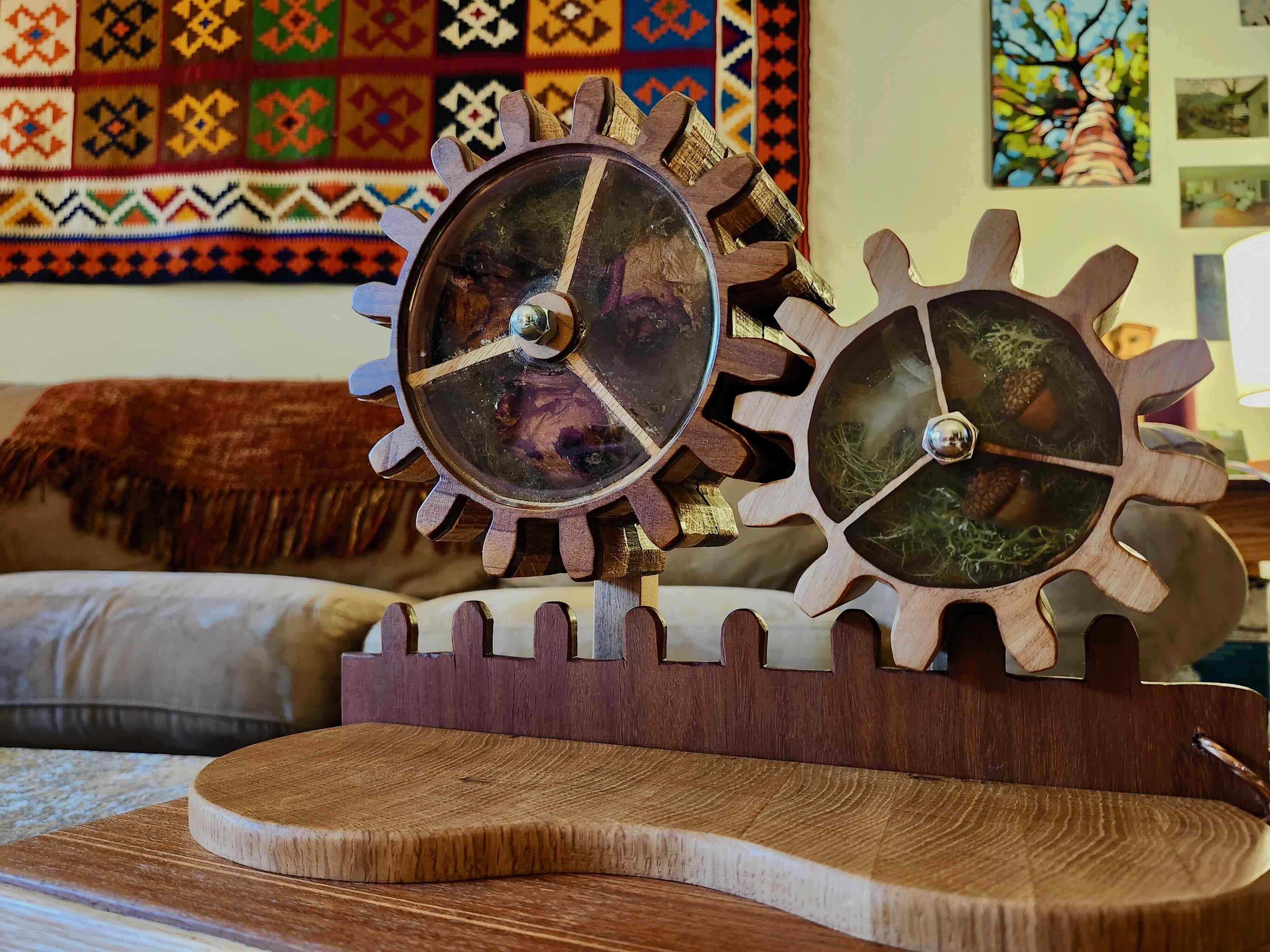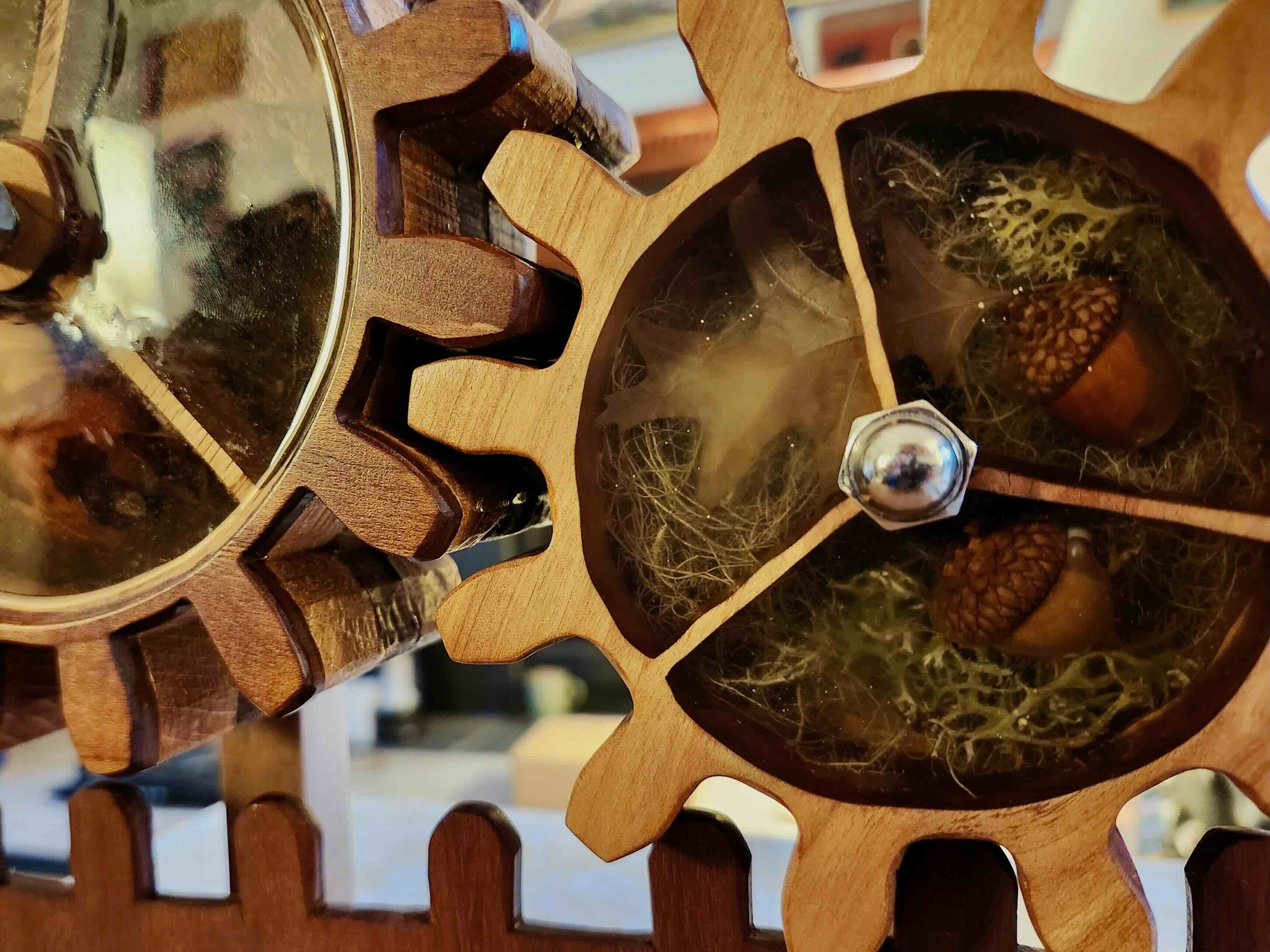The Unblocked Carver
Issue #1: From "Dukkha" to Dharma: A Path to Creative Liberation
“In moments of darkness and pain, remember all is cyclical. Sit quietly behind your wooden door: spring will come again.” - Loy Ching-Yuen
The first of the Buddha's Four Noble Truths is "Dukkha." It means: You will suffer, you will be dissatisfied, you will experience sorrow. We try to avoid it, and often make it worse in doing so!
What if I told you that in your suffering was hidden the keys to freeing your true creative self?
This new bi-weekly missive is for anyone looking to access creative flow and never get stuck in low-energy, unmotivated, frustrated, uncreative states of being.
Through personal art stories, Eastern and Western philosophical traditions, and practical insights, we'll find out what it means to find peace with Dukkha, and connect the source of our creative power.
This first issue is also the story of how I came to understand these things.
My mother is the person who most encouraged me to be creative.
This piece of wood art is for her. It's called Ecology of Time:


(Click here to see a video of the gears turning while the drawer opens!)
The Backstory
In 2020, I started this project for my mother. It would take four years, multiple homes, and a global pandemic before it was finished. This journey changed me in profound ways.
In 2019, I threw up my hands in anguish and dropped out of school. With nearly constant pain in my upper back, I couldn't see how all this essay writing and textbook carrying was leading to a better life.
With school behind me, I decided to finally pursue one of my long-lost loves: woodworking. I had quietly imagined having my own wood shop since high school, but kept putting it off.
Now, here we are in late 2024, and Oakmoss is four years old—a brief, but already complicated history.
Turning Points
Just as Oakmoss was taking shape, life took a turn. In 2020, my mother was diagnosed with breast cancer. Terrifying news.
Around that time, I had launched my Etsy store and was working out of a community maker-space where all the tools I could imagine were made available for a monthly membership fee. They even hired me for a summer, but the uncertainty of that time loomed large.
In December 2019, I remember someone at the shop saying "hopefully that coronavirus doesn't spread here…" We had no clue how much the world would soon change.
The Project Begins
Around this time, my uncle saw a gear-shaped drawer box that I made for a friend. Seeing the piece, my uncle had an idea: he commissioned me to make one for my mother while she was going through treatment.
I saw it as the perfect opportunity to create something beyond the usual commissions. I decided to push my limits, envisioning a drawer box with two large wooden gears that would turn in sync when the drawer opened or closed. It was a labor of love, an offering to my mother, and a test of my craft.
Dukkha, Blocks, Obstacles
What I thought would be a focused project became a long and treacherous journey. Since it began, I've worked in four wood shops, lived in seven homes, and gone through two relationships.
Through the global pandemic, my mother's illness, and personal upheavals, this piece became my steady anchor—a reminder of patience, resilience, and interpersonal support.
Being True to Yourself
In September 2020, I faced a tough decision. The maker-space where I worked on my projects and as an employee was going to enforce rules on its paying members that, in my view, violated personal autonomy and harmed the livelihoods of small business owners.
It didn't sit right with me, so I left. I moved all of my projects and tools out of my rented studio. I lost my wood shop access and my job in one breath.
Looking back, I'm grateful that I made that choice. We've all faced moments when life asks us to choose between our conscience and external pressures. This experience taught me about the importance of following my conscience even when it leads to hardship.
Suffering and Compassion
Through all of this, I'd been grappling with chronic back pain, a constant since my teenage years. Much emotional turmoil compounded atop the physical pain, and I struggled to hold jobs.
While my mother was undergoing cancer treatment, I felt hopeless—like I wasn't able to support her and my dad how I wished I could. A lot rested on my father's strength then.
I was angry and frustrated, but this was cause for deep reflection.
The suffering we endured opened me up to a new level of compassion, not just for others, but for myself.
"When the student is ready…"
Considering the many obstacles, dead ends, social ills, and pains of those years, I feel especially grateful now for what ensued during my time at university. There, Professor Trevor Carolan taught me much about the importance and power of writing. He assigned many readings related to Eastern philosophy.
A favorite book from that time is Hōjōki, by Kamo no Chōmei. The author describes how decades of continuous disasters and calamities in 13th century Japan led him to live in increasingly small dwellings, and finally a ten by ten foot hut, secluded in the mountains.
There's a line that feels particularly relevant here: "If you conform to the world, it will bind you hand and foot. If you do not, then it will think you mad."
Would you prefer a dilemma, or a predicament?
Professor Carolan's mentorship was a big synchronicity, arriving in my life at a crucial time. It wasn't just a simple teacher-student dynamic. Our conversations about the Yi Jing (The Ancient Chinese Book of Changes), Taoism, dharma, and Carl Jung's ideas on archetypes and synchronicity seemed to unfold as part of a much larger, more profound process.
“Until you make the unconscious conscious, it will direct your life and you will call it fate.” - C.G. Jung
"Debts and Lessons"
In the ensuing woodworking years, I sometimes felt like giving up on my tumultuous journey. Loose ends were hanging all around—projects I couldn’t finish, tasks I couldn’t move forward, new deadlines I had to meet for random customers.
I felt caught between the pressure to tie things up and the temptation to abandon them entirely.
Take, for example, the farmhouse kitchen island I've been building for my wood shop landlord. It's been two years, and it's still only halfway finished.
I felt overwhelmed by the weight of these unfinished commitments. But what I've come to realize is that unresolved work isn't a sign of failure—it's a constant in the natural ebb and flow of the creative process.
There's grace in acknowledging what's incomplete in your life. Through this realization, I've found more peace in following through than in running away from my debts, both material and spiritual.
Every loose thread taught me something about patience and the value of persistence.
I've also learned that deadlines aren't compatible with my art, and I don't want my art to be a business! That realization has been incredibly freeing, but I had to suffer first.
Resistance:
My writing mentor at University, Trevor Carolan, translated The Book of the Heart from the early 20th century Taoist master Loy Ching-Yuen:
"In moments of darkness and pain, remember all is cyclical. Sit quietly behind your wooden door: spring will come again."
Zen and Taoist philosophy teach that when we surrender our resistance to suffering, we find a kind of liberation. In time, I began to see my creative process in a new light—not as a way to escape suffering, but as a way to transform it.
When we face suffering in our creative work—whether it's self-doubt, external pressure, or personal pain—there's a powerful opportunity hidden in it:
What if, instead of resisting, we lean into the discomfort? For me, I found that every block in the process was a doorway to something new—an insight, a fresh approach, or a deeper understanding of myself.
Resolution
Surely you're wondering now when the good news comes in this story. Yes! My mother eventually went into remission! She is now cancer-free, and the joy of that news was a beacon of light during hard times.
It can be hard to create when there's a lot of stress and grief in your life. Her recovery also restored the joy in bringing this project to completion.
On top of that, she's now finding her own creative freedom with her lifelong interest in painting! Her work can be seen here:
@donna_may_paints on Instagram
Completion and Harmony:
It was just now, October of 2024, that I carved out the time to finally complete this piece.
Finishing Ecology of Time feels like bringing a long and difficult chapter to a close, letting me fully welcome all that comes next. The project—which became the logo of Oakmoss itself—stands as a symbol of everything I've learned: patience, symbiosis, resilience, and love of the process.
Oakmoss, the name of my wood art company, comes from a species of lichen—a partnership of at least two living organisms (a fungus and an algae) that mutually support one another. At the time, I wasn't even aware of this deeper meaning, but it is the perfect metaphor for what Oakmoss has become.
Seeds of Freedom:
Today, my shop is in a shipping container on a friend's property. I don't have a car, so it's a bit of a challenge to get there, but I've found a new rhythm. Discovering that I loved carving more than joinery has allowed much of my creative work to now be done at home.
I've discovered a kind of personal freedom I hadn't known before—a quiet, meditative approach to my craft.
Hand tools, simple processes, little noise; a contemplative practice that brings both beauty and peace into my life.
I've created The Unblocked Carver to share what I've learned about creativity and spiritual freedom. We all encounter blocks, but those blocks aren't barriers—they're doorways to new insights.
Some closing thoughts to ponder:
I've come to understand that freedom lies not on the other side of those blocks, but in understanding them in a new way.
In Zen, the uncarved block symbolizes pure potential—before anyone's ideas are imposed on it.
As a carver, I must let the wood tell me something about it's becoming.
If you brute-force everything, you run into all kinds of extra knots and friction.
To quote Master Loy Ching-Yuen again:
"To know Tao, meditate and still the mind. Knowledge comes with perseverance. The Way is neither full nor empty; a modest and quiet nature understands this. The empty vessel, the uncarved block; nothing is more mysterious."
Next time you hit a block in your creative process, ask yourself: What is this obstacle here to teach me? What could happen if I stopped resisting and began exploring?
Can you learn to see the block in your creative flow like an uncarved block of potential?
Oakmoss has grown into something I didn't expect when I first began. It's become a place where craft and philosophy intersect, where the creative process becomes a pathway to spiritual freedom.
Going forward, I'll be sharing not just my personal journey, but diving deeper into practical techniques—how you can transform blocks into breakthroughs, and transmute suffering into fuel for your creative fire.